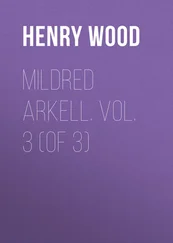Henry Wood - The Shadow of Ashlydyat
Здесь есть возможность читать онлайн «Henry Wood - The Shadow of Ashlydyat» — ознакомительный отрывок электронной книги совершенно бесплатно, а после прочтения отрывка купить полную версию. В некоторых случаях можно слушать аудио, скачать через торрент в формате fb2 и присутствует краткое содержание. Жанр: foreign_prose, literature_19, foreign_antique, на английском языке. Описание произведения, (предисловие) а так же отзывы посетителей доступны на портале библиотеки ЛибКат.
- Название:The Shadow of Ashlydyat
- Автор:
- Жанр:
- Год:неизвестен
- ISBN:нет данных
- Рейтинг книги:4 / 5. Голосов: 1
-
Избранное:Добавить в избранное
- Отзывы:
-
Ваша оценка:
- 80
- 1
- 2
- 3
- 4
- 5
The Shadow of Ashlydyat: краткое содержание, описание и аннотация
Предлагаем к чтению аннотацию, описание, краткое содержание или предисловие (зависит от того, что написал сам автор книги «The Shadow of Ashlydyat»). Если вы не нашли необходимую информацию о книге — напишите в комментариях, мы постараемся отыскать её.
The Shadow of Ashlydyat — читать онлайн ознакомительный отрывок
Ниже представлен текст книги, разбитый по страницам. Система сохранения места последней прочитанной страницы, позволяет с удобством читать онлайн бесплатно книгу «The Shadow of Ashlydyat», без необходимости каждый раз заново искать на чём Вы остановились. Поставьте закладку, и сможете в любой момент перейти на страницу, на которой закончили чтение.
Интервал:
Закладка:
She did so. She stayed where she was until the day was half gone; bearing up, it was hard to say how. She could not touch breakfast; she could not take anything. None saw how ill she was. Lady Sarah was wilfully blind; Sarah Anne had eyes and thoughts for herself alone. “What are you shivering for?” Sarah Anne once fretfully asked her. “I feel cold, dear,” was Ethel’s unselfish answer: not a word said she further of her illness. In the early part of the afternoon, Lady Sarah was away from the room for some time upon domestic affairs; and when she returned to it Mr. Snow was with her. He had been prevented from calling earlier in the day. They found that Sarah Anne had dropped into a doze, and Ethel was stretched on the floor before the fire, moaning. But the moans ceased as they entered.
Mr. Snow, regardless of waking the invalid, strode up to Ethel, and turned her face to the light. “How long has she been like this?” he cried out, his voice shrill with emotion. “Child! child! why did they not send for me?”
Alas! poor Ethel was, even then, growing too ill to reply. Mr. Snow carried her to her room with his own arms, and the servants undressed her and laid her in the bed from which she was never more to rise. The fever attacked her violently: but not more so than it had attacked Sarah Anne; scarcely as badly; and danger, for Ethel, was not imagined. Had Sarah Anne not got over a similar crisis, they would have feared for Ethel: so are we given to judge by collateral circumstances. It was only on the third or fourth day that highly dangerous symptoms declared themselves, and then Lady Sarah wrote to Thomas Godolphin the letter which had not reached him. There was this much of negative consolation to be derived from its miscarriage: that, had it been delivered to him on the instant of its arrival, he could not have been in time to see her.
“You ought to have written to me as soon as she was taken ill,” he observed to Lady Sarah.
“I would have done so had I apprehended danger,” she repentantly answered. “But I never did apprehend it. Mr. Snow did not do so. I thought how pleasant it would be to get her safe through the danger and the illness, before you should know of it.”
“Did she not wish me to be written to?”
The question was put firmly, abruptly, after the manner of one who will not be cheated of his answer. Lady Sarah dared not evade it. How could she equivocate, with her child lying dead in the house.
“It is true. She did wish it. It was on the first day of her illness that she spoke. ‘Write, and tell Thomas Godolphin.’ She never said it but that once.”
“And you did not do so?” he returned, his voice hoarse with pain.
“Do not reproach me! do not reproach me!” cried Lady Sarah, clasping her hands in supplication, while the tears fell in showers from her eyes. “I did it for the best. I never supposed there was danger: I thought what a pity it was to bring you back, all that long journey: putting you to so much unnecessary trouble and expense.”
Trouble and expense, in such a case! She could speak of expense to Thomas Godolphin! But he remembered how she had had to battle both with expense and trouble her whole life long; that for her these must wear a formidable aspect: and he remained silent.
“I wish now I had written,” she resumed, in the midst of her choking sobs. “As soon as Mr. Snow said there was danger, I wished it. But”—as if she would seek to excuse herself—“what with the two upon my hands, she upstairs, Sarah Anne here, I had not a moment for proper reflection.”
“Did you tell her you had not written?” he asked. “Or did you let her lie waiting for me, hour after hour, day after day, blaming me for my careless neglect?”
“She never blamed any one; you know she did not,” wailed Lady Sarah: “and I believe she was too ill to think even of you. She was only sensible at times. Oh, I say, do not reproach me, Mr. Godolphin! I would give my own life to bring her back again! I never knew her worth until she was gone. I never loved her as I love her now.”
There could be no doubt that Lady Sarah Grame was reproaching herself far more bitterly than any reproach could tell upon her from Thomas Godolphin. An accusing conscience is the worst of all evils. She sat there, her head bent, swaying herself backwards and forwards on her chair, moaning and crying. It was not a time, as Thomas Godolphin felt, to say a word of her past heartless conduct, in forcing Ethel to breathe the infection of Sarah Anne’s sick-room. And, all that he could say, all the reproaches, all the remorse and repentance, would not bring Ethel back to life.
“Would you like to see her?” whispered Lady Sarah, as he rose to leave.
“Yes.”
She lighted a candle, and preceded him upstairs. Ethel had died in her own room. At the door, Thomas Godolphin took the candle from Lady Sarah.
“I must go in alone.”
He passed on into the chamber, and closed the door. On the bed, laid out in her white night-dress, lay what remained of Ethel Grame. Pale, still, pure, her face was wonderfully like what it had been in life, and a calm smile rested upon it.—But Thomas Godolphin wished to be alone.
Lady Sarah stood outside, leaning against the opposite wall, and weeping silently, the glimmer from the hall-lamp below faintly lighting the corridor. Once she fancied that a sound, as of choking sobs, struck upon her ears, and she caught up a small black shawl that she wore, for grief had chilled her, flung it over her shoulders, and wept the faster.
He came out by-and-by, calm and quiet as he ever was. He did not perceive Lady Sarah standing there in the shade, and went straight down, the wax-light in his hand. Lady Sarah caught him up at the door of Sarah Anne’s room, and took the light from him.
“She looks very peaceful, does she not?” was her whisper.
“She could not look otherwise.”
He went on down alone, wishing to let himself out. But Elizabeth had heard his steps, and was already at the door. “Good night, Elizabeth,” he said, as he passed her.
The girl did not answer. She slipped out into the garden after him. “Oh, sir! and didn’t you know of it?” she whispered.
“No.”
“If anybody was ever gone away to be an angel, sir, it’s that sweet young lady,” continued Elizabeth, letting her tears and sobs come forth as they would. “She was just one here! and she’s gone to her own fit place above.”
“Ay. It is so.”
“You should have been in this house throughout the whole of the illness, to have see the difference between them, sir! Nobody would believe it. Miss Grame, angry and snappish, and not caring who suffered, or who was ill, or who toiled, so that she was served: Miss Ethel, lying like a tender lamb, patient and meek, thankful for all that was done for her. It does seem hard, sir, that we should lose her for ever.”
“Not for ever, Elizabeth,” he answered.
“And that’s true, too! But, sir, the worst is, one can’t think of that sort of consolation just when one’s troubles are fresh. Good night to you, sir.”
“No, no,” he murmured to himself; “not for ever.”
CHAPTER XIV.
GONE ON BEFORE
Thomas Godolphin walked on, leaving the high-road for a less-frequented path, the one by which he had come. About midway between this and the railway station, a path, branching to the right, would take him into Prior’s Ash. He went along, musing. In the depth of his great grief, there was no repining. He was one to trace the finger of God in all things. If Mrs. Godolphin had imbued him with superstitious feelings, she had also implanted within him something better: and a more entire trust in God it was perhaps impossible for any one to feel, than was felt by Thomas Godolphin. It was what he lived under. He could not see why Ethel should have been taken; why this great sorrow should fall upon him: but that it must be for the best, he implicitly believed. The best: for God had done it. How he was to live on without her, he knew not. How he could support the lively anguish of the immediate future, he did not care to think about. All his hope in this life gone! all his plans, his projects, uprooted by a single blow! never, any of them, to return. He might still look for the bliss of a hereafter—ay! that remains even for the most heavy-laden, thank God!—but his sun of happiness in this world had set for ever.
Читать дальшеИнтервал:
Закладка:
Похожие книги на «The Shadow of Ashlydyat»
Представляем Вашему вниманию похожие книги на «The Shadow of Ashlydyat» списком для выбора. Мы отобрали схожую по названию и смыслу литературу в надежде предоставить читателям больше вариантов отыскать новые, интересные, ещё непрочитанные произведения.
Обсуждение, отзывы о книге «The Shadow of Ashlydyat» и просто собственные мнения читателей. Оставьте ваши комментарии, напишите, что Вы думаете о произведении, его смысле или главных героях. Укажите что конкретно понравилось, а что нет, и почему Вы так считаете.












